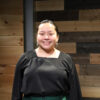In the fall of 2020, Brooke Lemmon, professor of education and director of special education, launched an autism spectrum disorder (ASD) social group.
The group, which meets for an hour once a week, has grown to consist of six regularly attending members, including three first-year students and three sophomores.Participants do not require a formal diagnosis: “Anyone who believes they have an ASD is welcome regardless of diagnosis.” Lemmon said. “We will focus on topics and strategies specific to people with ASD like social communication, restrictive, repetitive patterns of behavior, and sensory needs.”
Lemmon’s Ph.D. research explores “high impact ableism training and how it’s offered to faculty at small private colleges and universities.”
This includes the availability and types of support for students with autism in post-secondary settings. So, when two of her Identity, Culture, and Community (ICC) students identified as having ASD, she felt the timing was right to launch the group.
The support program is five-pronged:
Social group
Disability support service
Campus counseling
Faculty training (to launch in Feb. 2022)
Peer mentoring (to launch in Fall 2022)
“My goals for the group are simple. I want these students to be happy, healthy, and graduate with a degree from Goshen College,” said Lemmon. “Yes, they are neurodivergent, but they are brilliant students who sometimes need extra support that GC can provide if we are intentional.”
Despite the ongoing COVID-19 pandemic, the group has regularly met in person. Lemmon pointed out that although all the members are adapting as well as neurotypical peers, “In general, students with ASD struggle with uncertainty and change, so obviously a pandemic adds extra anxiety.”
Active efforts by the group include making the campus more friendly to those with sensory needs and working with professors to address issues of bias related explicitly to ASD in literature.
Anastasia Stevens, a sophomore TESOL major, found out about the group after sharing with Lemmon that she had recently been diagnosed.
By joining the group, Stevens was hoping to learn about other people’s experiences: “For me partially, it was understanding how other people dealt with a thing that felt new for me.”
Roundtable discussion is a feature significant to Stevens.
“A lot of the time the format is a couple of people talking about issues related to autism on campus; either something with a professor or a roommate and other members and Brooke giving advice.”
Both Lemmon and Stevens speak highly of the group dynamic. Stevens notes that it is tailored to their needs and that Lemmon is “flexible and good at reading the room.”
Lemmon praises the members for holding her accountable: “If I can’t make a meeting, they meet without me. If I forget to follow up, they let me know.”
The group has allowed Stevens to observe disparities across campus: “I am in the education department and it’s generally great, but I see other people whose experiences are completely different because they are in different departments.”
Since the group is generally open-door and not a significant time commitment, Stevens encourages those interested in attending to do so.
Interested individuals should contact Brooke Lemmon and watch the Communicator for peer mentoring opportunities in the fall of 2022.




